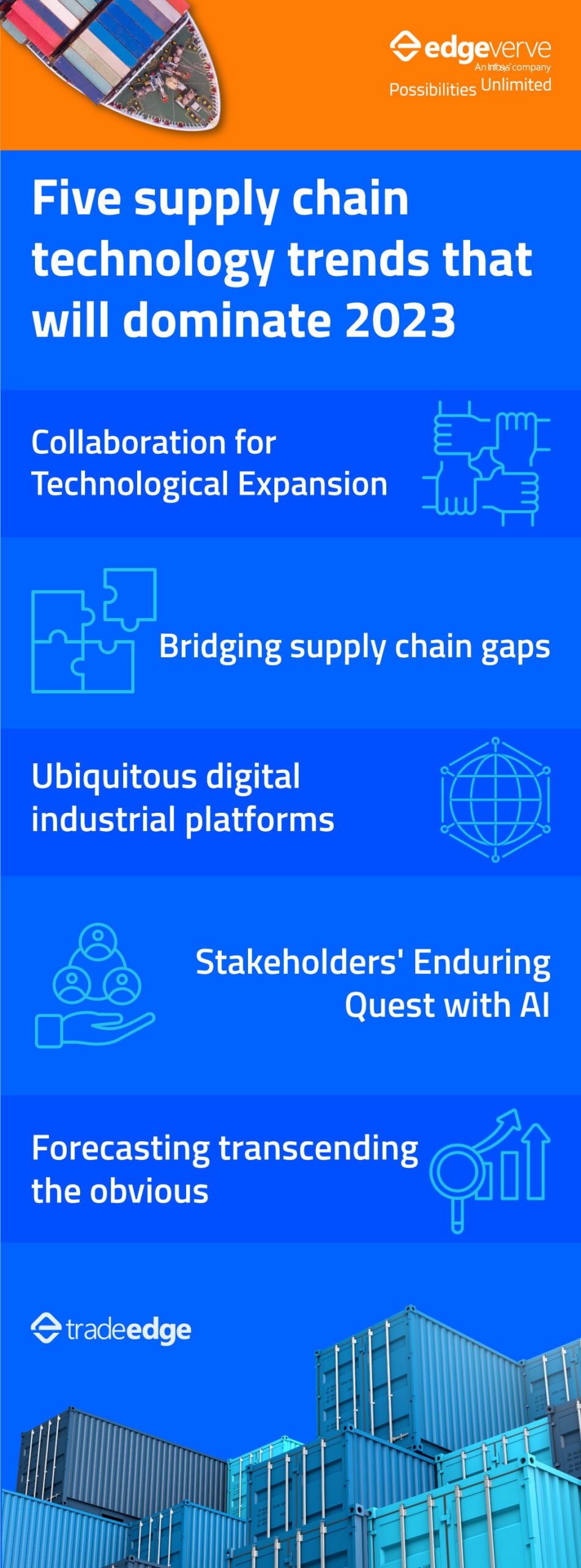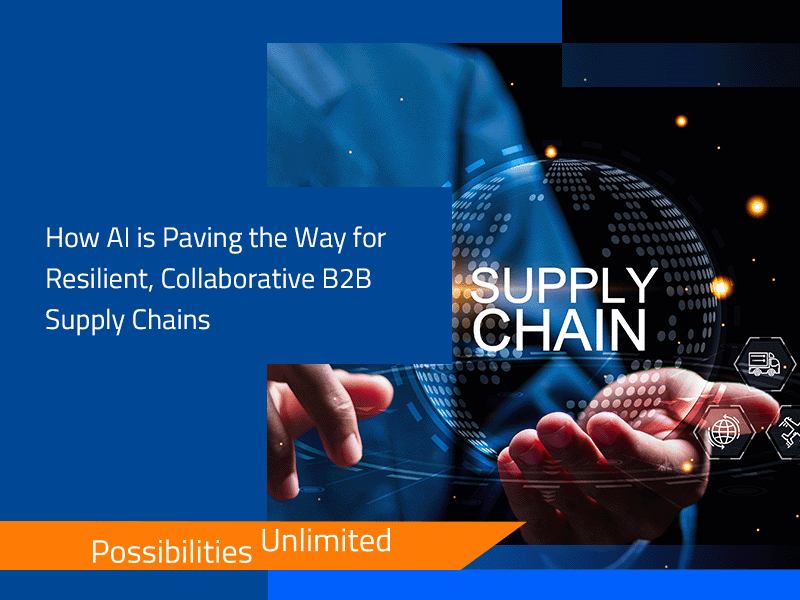Home > TradeEdge > Blogs > Embracing Technological Transformation: Five supply chain technology trends that will dominate 2023
Embracing Technological Transformation: Five supply chain technology trends that will dominate 2023

Table of Contents
The year 2020 was nothing short of extraordinary. The pandemic exposed us to new challenges and new opportunities. When the lockdown measures were implemented, a sense of apprehension regarding remote work emerged, causing a sudden standstill everywhere, including the supply chain sector.
The need for enhanced supply chain visibility, localized networks, and the urgent call for digitalizing end-to-end supply chain processes across industries became increasingly apparent.
As per a Gartner survey, only 21% of its respondents1 have managed to forge highly resilient supply chain networks. This finding underscores the pressing necessity for companies to embrace greater flexibility and enhanced visibility in their sourcing, manufacturing, and distribution activities.
As the business and technological landscape continues to evolve rapidly, it has become abundantly clear that enterprises must keep pace with these changes and adapt to the evolving needs of the supply chain technology solutions space.
“With the pandemic in the rearview, we are still headed toward faster, more automated, and more transparent solutions. So, what is in store for 2023?”
In the ever-evolving world of supply chain management, navigating the multitude of factors can be daunting. However, after a thorough analysis of the industry’s current state, I have identified the five points below as the most likely trends that will dominate the landscape in 2023.
These carefully selected trends encapsulate the pulse of the supply chain industry, offering invaluable insights into the key areas that will shape logistics and operations moving forward.

Collaboration for Technological Expansion
Two heads are better than one, which is true for the realm of technology. It is common for leaders to believe that their business challenges are unique, leading them to favor in-house solutions to maintain control. However, this approach may not always yield optimal results.
Enterprises can harness the power of collaboration, fostering partnerships with solution providers that offer tailor-made, transparent, and long-term solutions. These innovative offerings facilitate effective management of inventory movement and unlock new opportunities for growth and resilience.
Bridging supply chain gaps
In the wake of the pandemic, the importance of planning for unforeseen circumstances, overcoming challenges, and reimagining processes has become crystal clear. Yet, today’s supply chains still grapple with fractures exacerbated by silos created by Enterprise Resource Planning (ERP) systems. When companies attempt to optimize, it often comes at the expense of increased costs.
This said, supply chain leaders recognize the need for end-to-end digitalization and higher data transparency to improve the supply ecosystems effectively. According to Gartner, over 38% of organizations invest in supply chain tech supporting end-to-end business processes.2
Looking ahead to 2023, digital twin technology will emerge as the shining star, capturing the attention of executives who recognize the critical role of interoperable data models in establishing a single source of truth within complex, multi-stakeholder environments.
Ubiquitous Digital industrial platforms
Digital is the present and future. A company’s digital approach is the bedrock for building a resilient and prosperous brand.
Digital technology has permeated every facet of our lives, commoditizing everything from point solutions to comprehensive end-to-end transformations.
Imagine an automated supply chain process3 that harnesses technologies such as Artificial Intelligence (AI), Machine Learning (ML) Blockchain, and Automation to create resilient networks. This, in turn, reduces eliminating human errors, cost, and time!
An example of this is a global sports merchandiser that revamped its Point of Sale (POS)4 Business Intelligence through a transparent and digitally advanced solution.
Stakeholders’ Enduring Quest with AI
The hubbub around ChatGPT is a prime example of accessible AI. This widespread interest sets the stage for stakeholders to explore the application of advanced AI tools, particularly predictive analytics, in supply chain management, enhancing demand planning capabilities. However, the interpretability of predictions will emerge as a critical focus for modern businesses.
In the commercial industrial settings, scalability and adaptability drive the demand for efficient order management solutions. Achieving this goal necessitates integrating uniformly automated and streamlined processes utilizing powerful technological tools such as AI and ML.
As executives increasingly embrace data-driven decision-making, isolating predictions and constructing models with changing input values becomes paramount.
Forecasting transcending the obvious
By 2025, it is estimated that 25% of supply chain decisions will be made using intelligent edge ecosystems.5
With such a forecast, a resilient supply chain solution becomes paramount. This solution should embody transparency, and long-term viability and leverage cutting-edge technological tools to forecast trends accurately.
Since the pandemic, one of the sectors where consumer consumption patterns mattered was the food and beverages industry.6 There was a marked need to predict consumers’ buying patterns accurately.
This reality underscores the strategic advantage for companies that can accurately isolate emerging trends before they reach mainstream recognition. By leveraging a combination of Machine Learning (ML), Artificial Intelligence (AI), and alternative data analysis, market leaders prioritize proactive approaches to predict the unexpected and position themselves at the forefront of innovation.
Conclusion
The disruption caused by the pandemic significantly impacted supply chain operations. However, it also paved the way for lasting transformations through the emergence of advanced technological models.
Companies embracing these transformative trends will position themselves at a competitive advantage by establishing resilient, flexible, and automated supply chain value networks in the upcoming year. EdgeVerve can help with this proactive approach but empower enterprises across the globe with its digital transformative solutions designed to enhance resilience in the face of dynamic market conditions.
As a global technology provider with an unwavering commitment to innovation, EdgeVerve continues to craft many future-ready offerings, enabling businesses to adapt, thrive, and stay ahead in an ever-changing business landscape.
References:


Sateesh Seetharamiah
CEO, Edge Platforms, EdgeVerve
More blogs from Sateesh >